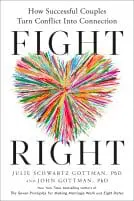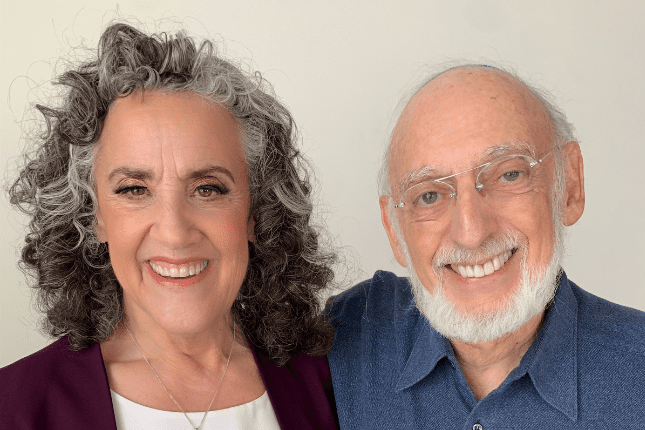We’ve written a lot about love: what makes it, what breaks it, what keeps it alive. But recently, we’ve felt an urgent push to home in on how we do conflict. One of the big reasons is that our conflicts aren’t going anywhere. The data tells us that whatever you’re fighting about, you’ll very likely always be fighting about. Overwhelmingly, the conflicts we have with our partners are not fleeting, situational, or easily fixable—they are perpetual.
There are two basic types of fights that couples have: solvable and perpetual. Your solvable fights are the ones that have some kind of solution. They are fixable. Let’s say you’re feeling put upon because you always have to load the dishwasher after your partner makes a mess preparing dinner. You and your partner might fight about this once you finally reach your boiling point (side note: talking about these types of things before you hit critical mass is definitely something we’ll be talking about!), but in the end you can probably find a solution of some kind: you’ll swap dinner prep and cleanup, or he’ll do the cleanup too while you take care of other household tasks that need doing. It’s a logistical problem, one that can be figured out once everybody has a cool head.
Perpetual fights are different. These are the issues that don’t go away. These are the things we end up fighting about time and time again, because they tap into some of the deeper differences between us: differences in personalities, priorities, values, and beliefs. And no matter how perfect someone is for you, these are always going to be there. We don’t fall in love with our clones. In fact, we’re often drawn to people who are very different from us in certain ways: people who don’t replicate us but complement us.
It comes down to this: the vast majority of our problems—69 percent, to be precise—are perpetual, not solvable. That’s a lot! That means that most of the time, whatever you and your partner are fighting about is not going to have a simple solution or any easy fix. And of these perpetual fights, 16 percent become gridlocked: the partners go round after round on the same topics, not only not getting anywhere, but causing more hurt, anger, and distance. And this is why fixing the way we fight is such an urgent issue. How we fight is, as we’ve said, how we communicate and connect. But (and we feel comfortable saying this, because of the sheer number of couples we’ve studied and tracked over the years) we are doing it wrong. We’re rushing in, wounding each other, missing opportunities, and then repeating the cycle again, the next time we fight about the same old thing.
This particular moment in human history also demands a different approach to conflict. Couples are more in distress now, in the COVID era, than ever before. Rates of domestic violence are up: in our international study with over forty thousand couples, we found that in couples seeking therapy, 60 percent were experiencing some degree of domestic violence. And there were other concerning statistics. In these couples, we found high rates of anxiety (27 percent), depression (46 percent), and suicidality (29 percent). Almost a third of all couples were struggling with issues surrounding substance abuse. And 35 percent were dealing with the fallout of an affair.
Our world seems to become more and more uncertain, and so often, we end up taking out our stress and anxiety on the people closest to us. When we fight with a partner, we aren’t fighting in a vacuum. The world gets in. By the time we arrive at a point of conflict with a partner, we’re often already carrying so much—our emotional bandwidth is short, we’re cognitively overloaded, and that shrinks our capacity to be gentle with each other. We carry the residue of the day with us when we interact—the worries and the pressures that we’ve experienced, and that weigh on us in ways we might not be aware of. And beyond the walls of our homes, conflict abounds. It proliferates in the virtual world, where the format of the interaction makes true understanding vanishingly rare. Our world has never been as polarized.
We are at a critical point in human history—a point where across the board, in every arena, we need to learn to set aside our defenses, open up, and fight for peace and understanding. This starts within the four walls of the home. Our romantic partnerships are the building blocks of our larger communities. They have ripple effects on our children, our friendships and extended families, our collaborations in the workplace. They influence our capacity to give back to the world and make change; they affect how we come together as a society. As we learn to fight better in our homes, we can learn to fight better in our communities, across political divides, in our society, and even as a human race.
It’s only human to have conflicts. It’s even humane to have conflicts—often, it’s exactly the right thing to do. But we need to bring our best humanity to our conflicts.
When we fight, we should be trying to create something better. That’s the ultimate goal of conflict: to create something better for yourself, for you and your partner as a couple, and for the world. Conflict doesn’t have to break us apart. Conflict and peace are not mutually exclusive. We can arrive at peace through conflict. We can combine kindness and gentleness with fighting. We can grow closer because of conflict. But to do this, we need to get to the heart of our conflicts.
 Excerpted from Fight Right: How Successful Couples Turn Conflict into Connection by Julie Schwartz Gottman, PhD and John Gottman, PhD. Copyright © 2024 Julie Schwartz Gottman, PhD and John Gottman, PhD. Excerpted by permission of Harmony Books, an imprint of Penguin Random House LLC. All rights reserved. No part of this excerpt may be reproduced or reprinted without permission in writing from the publisher.
Excerpted from Fight Right: How Successful Couples Turn Conflict into Connection by Julie Schwartz Gottman, PhD and John Gottman, PhD. Copyright © 2024 Julie Schwartz Gottman, PhD and John Gottman, PhD. Excerpted by permission of Harmony Books, an imprint of Penguin Random House LLC. All rights reserved. No part of this excerpt may be reproduced or reprinted without permission in writing from the publisher.
Julie Gottman
Julie Gottman, PhD, Co-Founder and President of The Gottman Institute and Co-Founder of Affective Software, Inc., was recently honored with the 2021 Lifetime Achievement Award by the Psychotherapy Networker for decades of work revolutionizing couples therapy. Winner of the Washington State Psychologist of the Year, she has co-authored seven books, including the popular Ten Principles for Doing Effective Couples Therapy; and And Baby Makes Three; and Eight Dates: Essential Conversations for a Lifetime of Love. She is also the co-creator of the immensely popular, The Art and Science of Love weekend workshop for couples, and co-designed the Gottman Method Couples Therapy Clinical Training Program, which she has taught nationally and in over 15 countries. Learn more at Gottman.com.
John Gottman
John Gottman, Ph.D., was voted one of the Top 10 Most Influential Therapists of the past quarter century and was recently honored with the 2021 Lifetime Achievement Award by the Psychotherapy Networker. Professor Emeritus in Psychology at the University of Washington, Dr. Gottman is known for his work on marital stability and relationship analysis through scientific direct observations, self-report and physiology. He is the author or co-author of over 200 published academic articles and more than 45 books, including the bestselling The Seven Principles for Making Marriage Work; What Makes Love Last; The Relationship Cure; and Why Marriages Succeed or Fail. He is the co-founder of The Gottman Institute and Affective Software, Inc., which has created a tele-therapy technology that will live on cell phones, computers, and tablets to assist therapists in couples therapy and offer direct relationship building services directly to couples. Learn more at Gottman.com.














